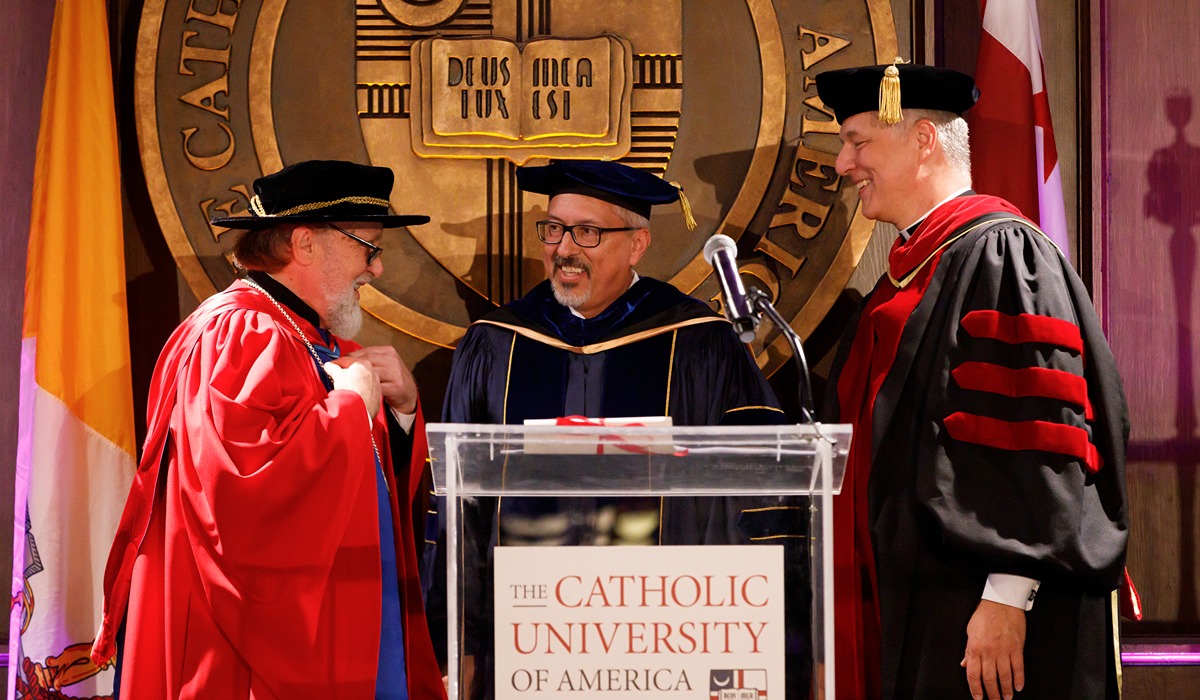

By Mariana Barillas
The first chair and professorship within the Institute for the Study of Eastern Christianity was formally installed last week, marking an important step in The Catholic University of America’s commitment to increasing awareness and understanding of the liturgical and theological traditions of Eastern Christian Churches.
Ukrainian Catholic liturgical scholar Very Reverend Peter Galadza, Ph.D., was installed as the Bishop Basil H. Losten Endowed Professor and Chair in Ukrainian Church Studies in the School of Theology and Religious Studies on Wednesday, Sept. 28. Father Galadza is the first of a planned community of Institute scholars focused on studying Eastern Christianity at the University. The Ukrainian Greek Catholic Church is in full communion with the Holy See and is the second largest particular church (sui juris) in the Catholic Church.
The endowed chair is named after Bishop Basil Losten, M.A. 1957, bishop emeritus of the Ukrainian Catholic Eparchy of Stamford. Bishop Losten, who attended the ceremony, is the son of prosperous dairy farmers and donated $5 million from family funds to the endeavor. University President Dr. Peter Kilpatrick shared during his remarks his hope that this “extraordinary generosity will enable more students to learn about the beauty and breadth of the Catholic faith as practiced by our Ukrainian Catholic brothers and sisters.”
Father Galadza said he hoped that the Institute will serve as “a dynamic think tank, harnessing the particular in the service of the universal.”
During his speech, he touched on three promising subjects of inquiry for Ukrainian Church studies that believes would advance the mission of the Institute as a whole: the means by which an Eastern Catholic Church can restore communion with its Orthodox counterpart without breaking communion with Rome; the role of women in the Church through the witness of clergy wives; and analysis of the methodology for moral reflection employed in the “Christ Our Pascha,” which is to date the only catechism published by any Eastern Catholic hierarchy.
“I could indeed talk about so many more promising projects for the new Center. But I will leave that – and the realization of such projects – to my successors,” said Father Galadza. “After several months at CUA I am convinced that they will be gratified by the environment they find here.”
Father Galadza is currently teaching a course on Byzantine funeral rites and will return to his role as professor emeritus at the University of Toronto and the Metropolitan Andrey Sheptytsky Institute of Eastern Christian Studies at the end of the semester. He is expected to give a lecture before his departure on the liturgical life of the Ukrainian Greek-Catholic Church during the Cold War, when it was the largest banned church in the world.
The highest-ranking Ukrainian Catholic prelate in the United States, Most Reverend Borys Gudziak, archbishop of the Ukrainian Catholic Archeparchy of Philadelphia, led a prayer for all those who bear witness to the faith, including those impacted by the Russian invasion of Ukraine. He is a member of the University’s Board of Trustees and president of the Ukrainian Catholic University, which is the only Catholic university in the former Soviet Union. The pandemic and then the war have disrupted many opportunities for institutional educational collaboration, but the hope is that such initiatives including weekly student-to-student internet meetings will be the start of building bonds without borders toward a study abroad program between the two universities.
Very Reverend Mark Morozowich, S.E.O.D., dean of the School of Theology and Religious Studies and a Ukrainian Catholic priest, discussed the long history of persecution of Catholics in Ukraine as an important witness and testimony to the faith, especially amid the hardship suffered by the Ukrainians through the current war.
“This Chair and the Center will continue the study of the rich Ukrainian ecclesiastical patrimony for future generations. Its ecumenical approach will strive to build bridges as well as fostering the vitality of these communities here in the United States as well as in Ukraine,” said Father Morozowich.